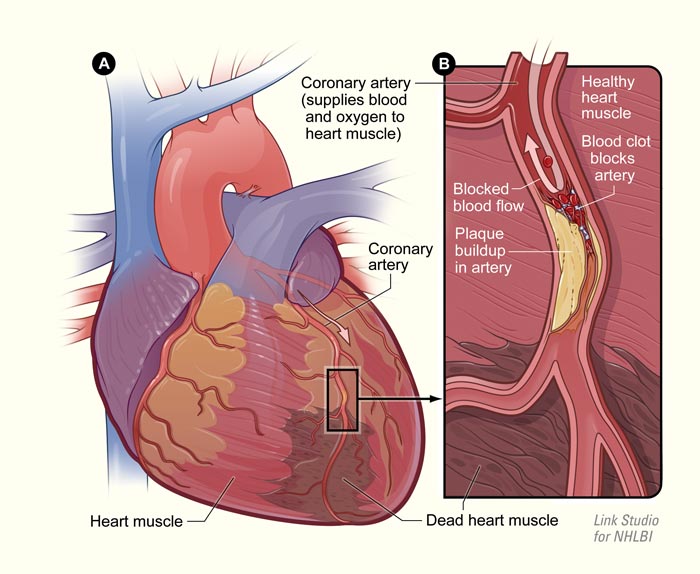Key heart tests include:
Electrocardiogram (ECG or EKG)—This records the electrical activity of the heart as it contracts and relaxes. The ECG can detect abnormal heartbeats, some areas of damage, inadequate blood flow, and heart enlargement.
Blood test—Checks for enzymes or other substances released when cells begin to die. They are "markers" of the amount of damage to your heart.
Nuclear scan—Reveals the damaged areas of the heart that lack blood flow. It also can show problems with the heart's pumping action. The test uses radioactive tracers to study how blood flows in your heart.
Coronary angiography (or arteriography)—A test that uses dye and special X-rays to show the inside of your coronary arteries.
Treatment
You will need to change your lifestyle to help prevent or control coronary heart disease (CHD) and so reduce the risk of a first or repeat heart attack. Sometimes, though, you may need medicines.
Antiplatelet drugs, such as aspirin, keep blood clots from forming. These drugs help to keep arteries open in those who have had a previous heart bypass or other artery-opening procedure, such as coronary angioplasty.
Anticoagulants (blood thinners) prevent blood from clotting or prevent existing clots from getting larger. They can keep harmful clots from forming in your heart, veins, or arteries. Clots can block blood flow and cause a heart attack or stroke. Common names for anticoagulants are "warfarin" and "heparin."
Digitalis makes the heart contract harder when the heart's pumping function has been weakened. It also slows some fast heart rhythms.
ACE (angiotensin converting enzyme) inhibitors stop production of a chemical that narrows blood vessels. They help control high blood pressure. You may also take an ACE inhibitor after a heart attack to help the heart pump blood better. People with heart failure, a condition in which the heart is unable to pump enough blood to supply the body's needs, may also take them.
Beta blockers slow the heart and make it beat with less contracting force, so blood pressure drops and the heart works less hard. They are used for high blood pressure, chest pain, and to prevent repeat attacks.
Nitrates (nitroglycerin) relax blood vessels and stop chest pain.
Calcium channel blockers relax blood vessels. They are used to treat high blood pressure and chest pain.
Diuretics decrease fluid in the body. They treat high blood pressure. Diuretics are sometimes referred to as "water pills."
Blood cholesterol-lowering agents decrease LDL ("bad") cholesterol levels in the blood.
Thrombolytic agents (clot busting drugs) are given during a heart attack to break up a blood clot in a coronary artery and restore blood flow.
What Is Acute Coronary Syndrome (ACS)?
Many people hear the term "acute coronary syndrome" related to heart attack. But just what is it? Acute coronary syndrome (ACS) is a life-threatening form of coronary heart disease (CHD) that occurs when the heart muscle does not receive enough oxygenrich blood. ACS includes myocardial infarction (MI), also known as a heart attack, and unstable angina, or sudden, severe chest pain that typically occurs when a person is at rest.
Every year, ACS affects an estimated 1.4 million people in the United States and another 1.4 million people in Europe. Even though patients receive intense ACS management while in the hospital, new treatments are needed to reduce the risk of acute heart attack, stroke, and cardiovascular death. ACS patients receive anticoagulant drugs but this treatment is limited to the hospital.
